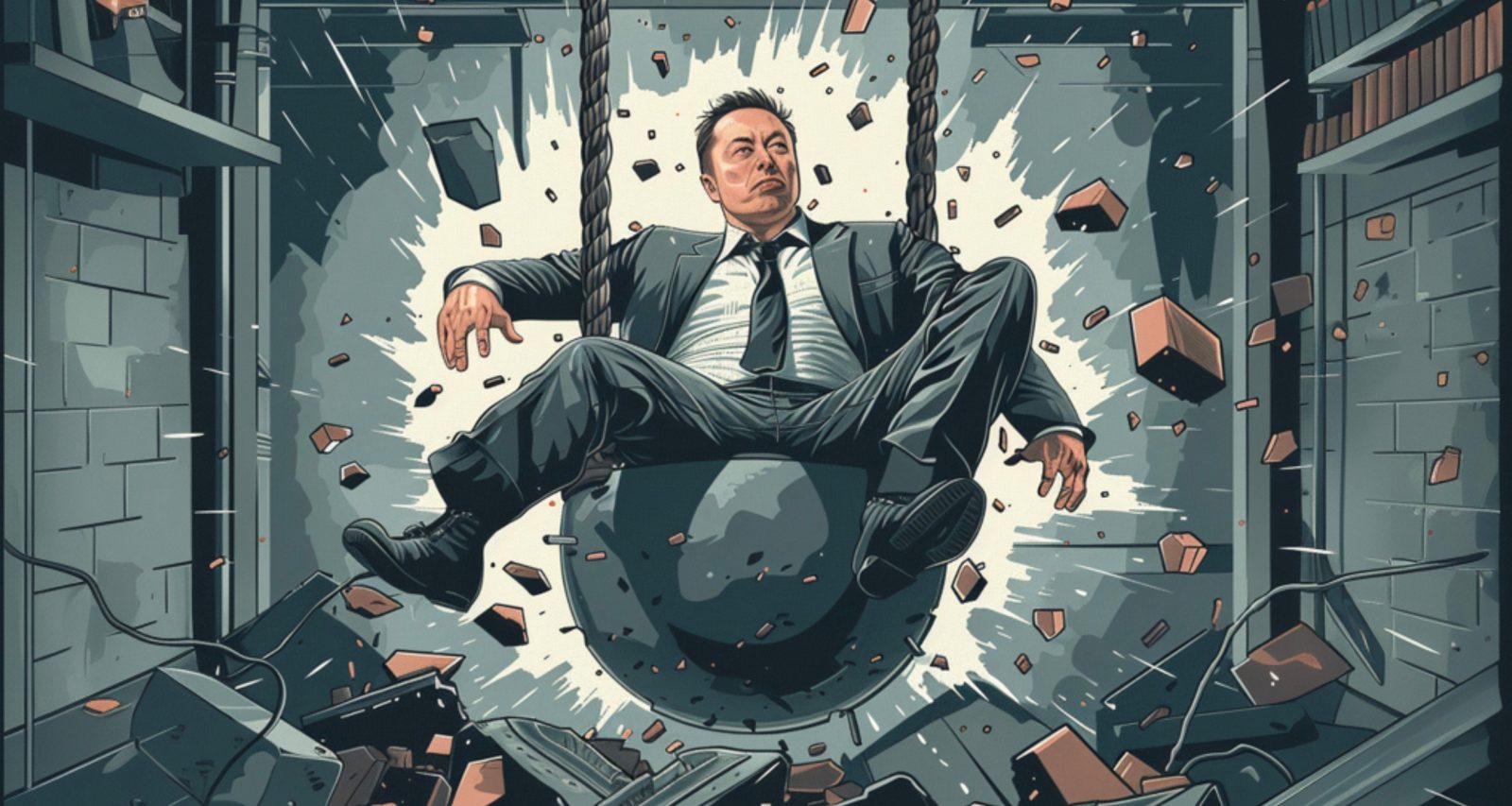
Tesla’s brand loyalty levels dropped from the best in the industry to fairly middling results, according to new data from S&P Global Mobility, and it’s all because of the company’s CEO, Elon Musk.
S&P Global Mobility tracks sales data across the automotive industry, and its new customer loyalty numbers are out, shared with Reuters this morning.
The numbers show a troubling trend for Tesla, and a historic drop in customer loyalty for the brand that long held the #1 title in that space.
S&P’s data shows that Tesla’s customer loyalty took a “nosedive” in July 2024, timed alongside Musk’s public commitment of hundreds of millions of dollars to the anti-environment political campaign of a convicted felon who had promised to do his best to destroy the EV industry (and who is Constitutionally barred from holding office in the US). And it continued to decline as his relationship deepened with the same candidate.
According to the Reuters story, S&P’s numbers show that Tesla customer loyalty peaked at 73% in June 2024, but took a “nosedive” in the next month, and ended up bottoming out in March at 49.9%. That means about a third of Tesla owners who would have bought another Tesla decided to buy another brand as well.
S&P’s data is not based on surveys, but rather household-level data of which cars each household is buying.
Tesla’s loyalty since recovered to 57.4% in May, the most recent month included in the S&P data, still far less than its previous peak.

As can be seen in the graph above, Tesla was in a league of its own consistently. There were only single months where any other brand might have matched Tesla’s brand loyalty numbers over the course of the last several years – and this held true consistently in the period before S&P’s chart as well, as we at Electrek have covered many times in the past.
The drop from 73% to 49.9% even put Tesla briefly below the industry average, something which the company has never seen before. Even after recovery, Tesla is no longer in its first-place-by-a-long-shot position, and now behind Chevy and Ford and about the same level as Toyota.
Tom Libby, an analyst with S&P, was quoted by Reuters as saying he’s “never seen this rapid of a decline in such a short period of time.”
Another metric, customer defections, also showed trouble for Tesla. Customer defections show how many more households are switching from another brand to buy your brand, compared to the number of households switching from your brand to another.
Tesla’s customer defection numbers were “in a different stratosphere” to the rest of the industry for a long period of time. From 2020-2024, Tesla on average acquired five times more customers than it lost to other brands. The next-highest performers were Genesis at 2.8 and Kia/Hyundai at 1.5/1.4.
It makes sense that Tesla would gain more customers than it loses, given that it was and is a relatively new and growing brand. If people are switching to an EV, there’s a good chance they’ll switch to a Tesla since that’s the most well-known EV brand and is widely available. But Tesla’s numbers were really high.
But since July 2024, the defections have dropped significantly. Now, Tesla is below 2, a more than 60% drop in its defection rate, and putting it back in touch with the rest of the industry.
Further, it has been eclipsed by other brands – and not just startup EV brands who have the advantage of being new and thus naturally having a high conquest rate. Rivian, Polestar, Porsche and Cadillac all now exceed Tesla’s defection rate.
These poor results track alongside Tesla’s recent sales results, which have been dropping in just about every territory, even doing damage to the entire EV market as a result.
Today’s results, and Tesla’s recent poor earnings, spell trouble for Tesla, showing how Musk’s influence are damaging the high-flying company, which has always been treated as an exception in the industry (and in the stock market) due to its exceptional results across several customer and growth metrics.
Now, Tesla’s results are no longer exceptional – or rather, they’re exceptional in the opposite direction, with Tesla being one of few EV brands with falling sales in a rising global EV market.
But despite the trouble all of this spells for Tesla, it seems like it’s not spelling trouble for Musk himself. Even though he’s the reason that Tesla is crashing in the first place, the Tesla board just rewarded him with $26 billion today – a payday with more money for a single bad employee than Tesla has made in any year over its entire history, even as Tesla’s profits have been drastically declining this year as a result of Musk’s actions.
Electrek’s Take
We’ve previously covered how embarrassed owners have been modifying their cars with bumper stickers or badges to separate themselves from the image that Musk has built for the company. But now we have data showing just how many of them have stopped buying Teslas.
And it’s not just affecting prospective customers, but the customers who know how good the company’s cars are, and who had previously returned to buying Teslas in industry-leading numbers, and yet can’t stomach coming back because Musk is just so comically bad.
It would be interesting to see more from the graph above. We’re betting the numbers before Jan 2022 might have been even higher, as Musk’s public advocacy had already taken a turn towards the bizarre as he fell deeper into his twitter addiction.
But it’s clear what the biggest catalyst is – Musk’s ill-considered idea to give hundreds of millions of dollars to one of the dumbest people on the planet – someone who Musk himself had previously correctly said was “not good for America or the world.”
To be clear, Musk has always been relatively outspoken. But there were times where he was able to limit his advocacy to some more reasonable positions, stay somewhat more on message about the importance of fighting climate change (not anymore…), and stay out of the more obviously partisan political nonsense.
General wisdom does state that CEOs shouldn’t be too divisive, because dividing your customer base will only lead to a smaller addressable market. Surprise, it turns out that general wisdom is right.
Musk’s political advocacy has included support for German neo-Nazis, agreeing with a defense of Hitler’s actions in the Holocaust, and many other white supremacist statements, along with his well-publicized public nazi salutes.
Then, Musk joined an advisory position where he spent his days finding ways to increase (not decrease) the country’s budget deficit, violate laws, and kill literally millions of people.
It should be a surprise to nobody (who isn’t deep in a twitter echo chamber that he himself devised) that all of this drove protests against the company and caused incredible damage to the Tesla brand which Musk has attached his public persona to.
And I would contend that supporting white supremacists is stupid in itself, but doing so publicly when you lead a company that relies on a good public perception, all while supporting someone whose stated goal is to destroy your industry, is particularly stupid. But his stupidity hasn’t just been limited to politics, but also to purely business decisions. And we can see how stupid it all is with the effect it has all had on Tesla’s sales results.
It would be interesting to see what happened in the intervening months, given the public breakup between Musk and Mr. Trump – though Musk has since apologized for his outburst (even though what he said was true), and Musk has continued to spread racist nonsense in the meantime. Protests are still ongoing and sales are still dropping, so the public seems to have a memory of Musk’s ridiculousness, even if he’s gotten slightly more quiet in recent weeks.
It would also be interesting to see how much different the results would be if there were more great EVs available in the US at good prices. EVs from other brands are getting better, but Tesla still has both great cars and a well-considered ecosystem around them, and $299/mo for a Model 3 is hard to beat. If there were more mass-market EV-focused challengers (like the upcoming Rivian R2/R3, a non-tariff-affected Volvo EX30, any of the myriad Chinese options available overseas, etc.), we think Tesla’s loyalty results might be even less resilient than they are.
The 30% federal solar tax credit is ending this year. If you’ve ever considered going solar, now’s the time to act. To make sure you find a trusted, reliable solar installer near you that offers competitive pricing, check out EnergySage, a free service that makes it easy for you to go solar. It has hundreds of pre-vetted solar installers competing for your business, ensuring you get high-quality solutions and save 20-30% compared to going it alone. Plus, it’s free to use, and you won’t get sales calls until you select an installer and share your phone number with them.
Your personalized solar quotes are easy to compare online and you’ll get access to unbiased Energy Advisors to help you every step of the way. Get started here.
FTC: We use income earning auto affiliate links. More.













